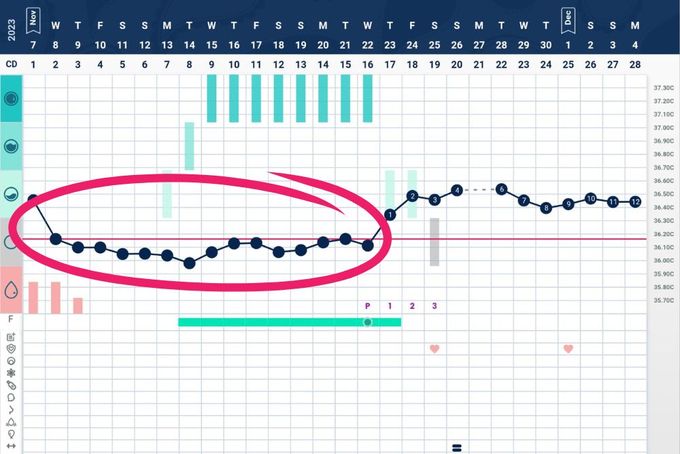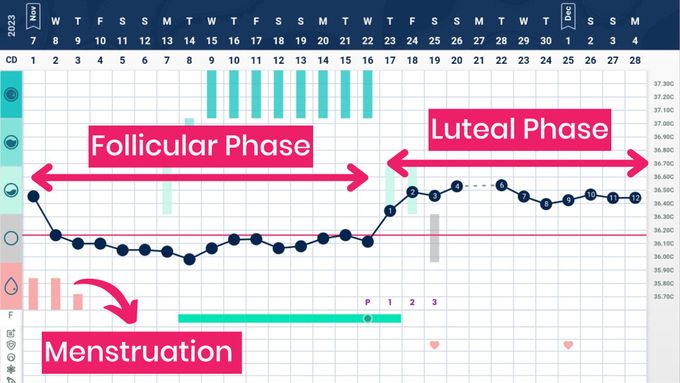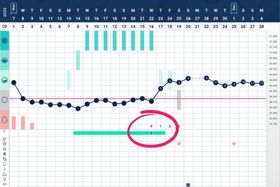What Is the Follicular Phase? Find the Ultimate Guide Here
Updated March 12, 2025

Your menstrual cycle can be split into two main phases: follicular and luteal. The follicular phase starts with your first day of menstruation through to confirmation of ovulation (ovulation confirmed can be determined using various fertility awareness-based methods).
During the follicular phase, there is a bleed (true menstruation) which is typically followed by several days of low hormones progressing to the development of eggs within the ovaries. At peak fertility, ovulation occurs and an egg is released. This day is the last day of the follicular phase.
Hormones
Hormonally, there are four dominant hormones at play throughout your cycle – estrogen, progesterone, follicle-stimulating hormone (FSH), and luteinizing hormone (LH). At the beginning of your cycle, both estrogen and progesterone are low. Once follicular development commences, FSH begins to rise thereby triggering a rise in estrogen production. Peak estrogen results in a surge of the hormone LH which in combination results in the release of the egg. LH can be detected via the ovulation predictor kits or OPKs.
Fertility
During the follicular phase is the only time you can become pregnant, although you can't become pregnant every day of your follicular phase. During the last 5-7 days of your follicular phase is the "fertile window" - or the window of time in which you can become pregnant from unprotected intercourse.
If you're trying to become pregnant, identifying the conclusion of the follicular phase (and start of the luteal phase) will help you know when to test for or assume pregnancy. If you're avoiding pregnancy, successfully identifying the end of the follicular phase will tell you when to expect your next period.
Length
The follicular phase can be described as the ‘variable’ part of your cycle. In fact, many situations can contribute to the lengthening or shortening of this phase including stress, travel, illness, medications, and so forth. In short, if you are experiencing an illness -this phase can be lengthened and lead to a delay in ovulation.
Perhaps in the past, you experienced cycles where you expected your period, and it didn’t come! You thought as though your period was late. In fact, it's likely that ovulation was delayed thereby resulting in a longer cycle overall. Indeed your bleed was not late but right on time - it was your ovulation that was late!
There are some circumstances where a prolonged follicular phase is considered normal. For example,
- In breastfeeding folks where fertility via nursing is suppressed, sometimes for months or even years, this is normal.
- In those who are just beginning to cycle such as those entering puberty.
- In a person who is peri-menopausal, where they have cycled normally throughout their reproductive lifetime and now follicular phases are becoming shorter or longer.
There are cases where continual follicular phase lengthening is not normal, but a reason is identified. For example,
- In those folks with PCOS where ovulation is delayed.
- In those who have been diagnosed with an autoimmune disorder.
- In someone who has one or more uterine fibroids.
- In a person who has either an overactive (hyper) or underactive (hypo) thyroid disorder.
If you are of reproductive age, do not fit in one of the categories of positive exceptions above, and feel as though your cycles are more often than not long and/or irregular, it may be worth it to begin tracking your cycles with a fertility awareness-based method. You can then take that information to your doctor (if you need tips on how to talk to your doctor about FAM, check out this article).
A symptothermal method using the Tempdrop is a great place to start in the fertility awareness world. This can provide you with information about the phases of your cycle and may point to seeking further advice through healthcare professionals.
The follicular phase is an important phase of your cycle – tracking your cycle and this phase can provide you with valuable information through the basis of understanding the hormonal process of the cycles and the circumstances that may impact it!







